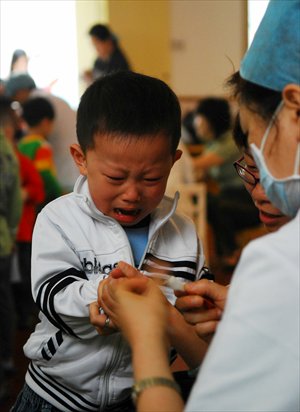
A boy at a kindergarten in Nanchang, Jiangxi Province takes a medical examination on May 13, 2009. Photo: CFP
Getting a child into school can be a grueling process for parents in China, but for one mother in Shenyang, Liaoning Province, it proved to be a particularly bitter ordeal this year, when she discovered her 4-year-old daughter was a carrier of the Hepatitis B virus (HBV).
The woman, who asked that she and her daughter remain anonymous, had to come to terms with the fact that she would not only have to cope with her daughter's condition, but also tackle the many schools who still illegally discriminate against these children.
"My daughter was turned away by four kindergartens after her health certificate showed she was identified as an HBV carrier," she told the Global Times.
Ignoring the rules
The Beijing Yirenping Center, an NGO dedicated to fighting against discrimination in China, issued a report on Thursday, which claimed that more than half the hospitals and physical examination facilities in China screen children for HBV when giving them physical examinations during the enrollment process, even though kindergartens, schools and enterprises have been banned from screening for HBV during their recruitment processes since 2010.
The report, entitled "Hepatitis B Discrimination in Kindergartens 2011," was released after the NGO carried out a sample survey of 40,000 nursery schools and 2,329 maternity and child-care institutions on the Chinese mainland.
According to the report, children with HBV found it difficult to enter kindergarten because more than 68 percent of the kindergartens violated the regulations so they could examine children for HBV during enrollment.
More than 30 percent of the kindergartens refused to accept HBV carriers, the report revealed.
"These hospitals and physical examination facilities are set in their ways. If they could just stop carrying out HBV screenings during these physical examinations, the problem would be solved," Lu Jun, the head of the Yirenping center, told the Global Times.
There are around 93 million HBV carriers in China. HBV can only be transmitted through blood, sexual and maternal-neonatal transmission, and regular daily activities would not lead to the virus being transmitted, according to the World Health Organization.
Following the money
"Because of economic interests, some health institutions secretly screen for HBV and report the results to schools or companies," Lei Chuang, an HBV carrier who fights against discrimination, told the China Youth Daily.
"These violations occur as a result of weak punishments for violators and some health institutions' desire for profits," Li Fangping, a Beijing lawyer, told the Global Times.
The laws state that hospitals and physical examination facilities that break the law should cease carrying out such examinations and pay a fine of 1,000 yuan ($148).
Li added that the problem is compounded by the fact that fighting against this discrimination by filing lawsuits is a time consuming process with uncertain odds of success.
Yang Hua (pseudonym), the father of a 5-year-old boy in Hubei Province, said he was cheated by a local medical institution, which secretly screened his son for HBV.
"Even though the HBV test was not listed on the health certificate, we found the medical institutions had secretly carried out the test on my son, in order to charge more money," Yang told the Global Times.
His son was not rejected by the kindergarten. Instead, the boy was required to eat separately from the other students when dining.
"They asked my son to use his own tableware when dining with the other students," Yang said.
Xu Kaiwen, a psychology expert from Peking University, told the Global Times that extended separation from other students can have long-term consequences.
"Being isolated from the other kids may cause psychological disorders in some children and bring harm to their mental well-being," he said.
Yang is unlikely to pursue the case. "We want to protect our child. Filing a lawsuit would mean putting my boy in the public eye. That's something we would never do," Yang said.
In some cases, parents resorted to illegally hiring others to stand in for their children during physical examinations. One anonymous agent in Wuhan, who procures these stand-ins, told the Global Times that in first-tier cities such as Beijing, Shanghai and Guangzhou, they charge around 1,200 yuan to find a stand-in.
Raising awareness
Some kindergartens remain unrepentant, saying they perform HBV screenings in order to protect their students.
"Kids have a weak resistance to the virus, and to ensure the safety of all the children, it is still necessary to screen for HBV among the children," the head of a kindergarten in Beijing, who gave her surname as Zhang told the Global Times.
Zhang said her kindergarten does not reject any child who is diagnosed as HBV positive, but will pay special attention to the child after they are enrolled.
Some parents, however, still have concerns. "I would be really worried if HBV carriers were in the same class as my son. After all, children have no sense of self-protection at all," Zhou Yanhua, a Beijing mother of a 5-year-old, told the Global Times.
Zhou said she would like schools to be able to resume HBV tests to ensure the safety of the children.
On the other hand, Li Hua, a mother in Shandong Province, who is also an HBV carrier, told the Global Times that the government has to raise awareness regarding the prevention of HBV to help eliminate the discrimination against these students.
Lu said that the Yirenping center reports kindergartens that reject children with HBV to local health bureaus and education departments in Shangdong, Jiangxi and Shaanxi provinces, however, there has been no reply as yet.
"The health bureaus should impose harsh penalties on health institutions that break the law in order to tackle the problem," Lu said.